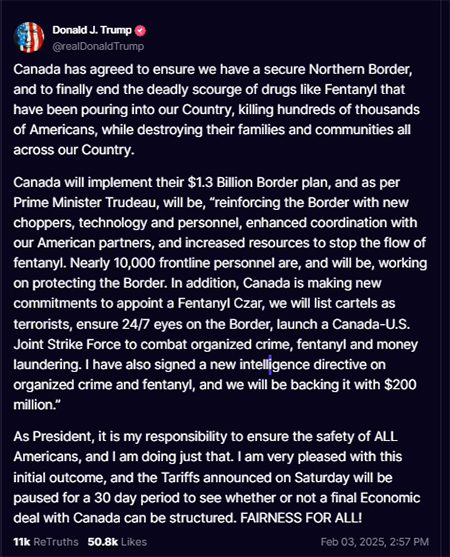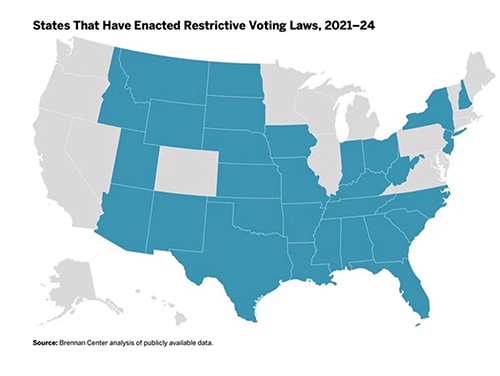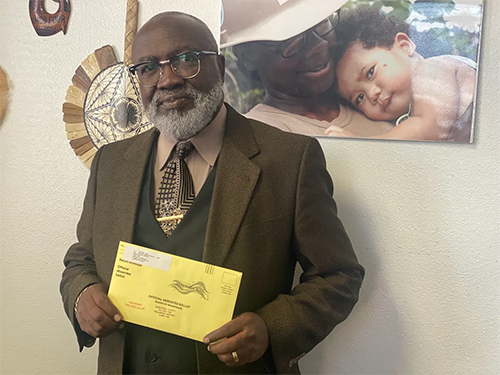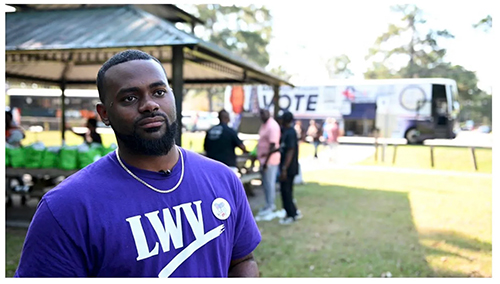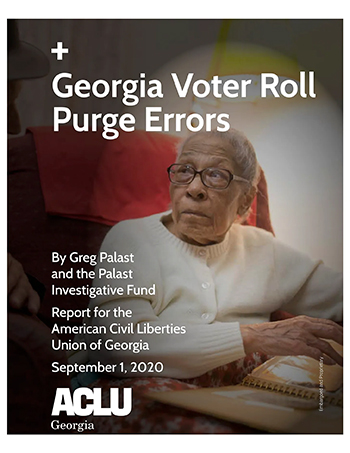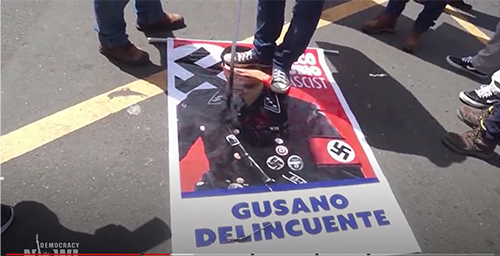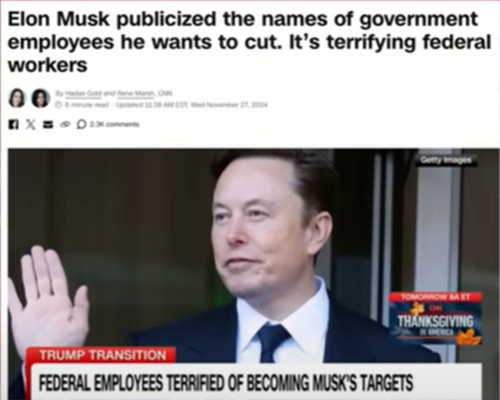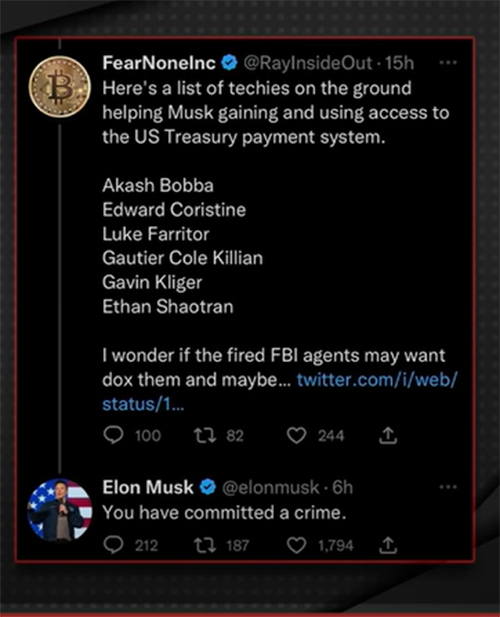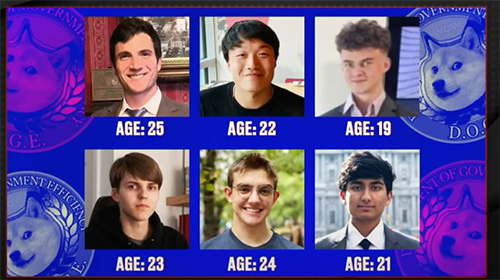Part 1 of 2
CREW, Democracy Forward sue to block Trump’s illegal plan to fire government workersJanuary 28, 2025
Updated
January 29, 2025
https://www.citizensforethics.org/legal ... s-illegal/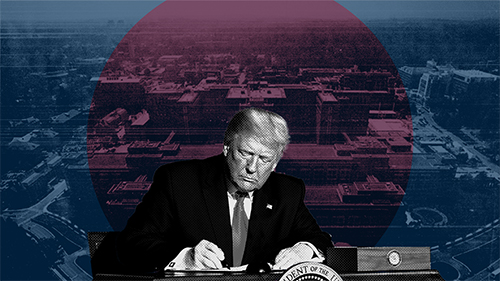
President Trump’s executive order paving the way to convert potentially tens of thousands of merit-based civil servants to at-will employees, enabling political appointees to fire and replace them with loyalists, is unlawful and exceeds the president’s authority, according to a lawsuit filed today in Maryland federal court by Public Employees for Environmental Responsibility (PEER). PEER is represented in the suit by Citizens for Responsibility and Ethics in Washington (CREW) and Democracy Forward.
“Donald Trump’s executive order reverses course on 140 years of civil service reform meant to ensure federal employees have the required skills and expertise to best serve the American people and protect the civil service from dangerous nepotism and cronyism,” said CREW President Noah Bookbinder. “With one of his first acts in office, Donald Trump put the country on a path toward getting rid of merit-based hiring and staffing crucial government functions with unqualified loyalists.”
Trump’s order, nearly identical to his previous Schedule F executive order in 2020, would lay the groundwork to convert a huge percentage of the federal civil service from employees who can only be fired for cause to at-will employees who can be fired for any reason at all. Thousands of employees—including those who protect our public health, the environment and our food and water—who were hired for their expertise and serve in non-partisan positions could be stripped of vested job protections in one fell swoop, in violation of their due process rights and in excess of the president’s constitutional authority.
“The American people rely on non-partisan and professional civil servants to serve the public. There are 2.2 million civil servants that work in every community across our country to, among other things, make sure that our communities and our nation are protected, our food and medicine are safe, our air and water are clean, and our children have access to education.
“The Administration’s efforts, outlined in Project 2025, to decimate the ability of our government to do work for the people will harm everyday Americans. We are challenging these actions in court,” said Skye Perryman, President and CEO of Democracy Forward.
For more than 30 years, PEER has provided pro bono legal services and other support to scientists, public health professionals and other civil servants who seek to uphold high standards of scientific integrity within their agencies, including by defending whistleblowers and shining a light on illegal government actions. The renewed Schedule F order has already directly impacted PEER’s clients and PEER’s ability to fulfill its mission.
“This profoundly troubling move advances efforts by the administration to politicize policymaking by removing scientists and experts and inserting, instead, those who will follow the wishes of political leaders,” said Tim Whitehouse, PEER Executive Director. “It would allow political leaders to reach deep into federal agencies to remove and replace unknown and unheralded civil servants whose work is critical to keeping our country safe but whose viewpoints may run afoul of the prevailing political narrative of the day.”
*****************
UNITED STATES DISTRICT COURT FOR THE DISTRICT OF MARYLAND
PUBLIC EMPLOYEES FOR ENVIRONMENTAL RESPONSIBILITY
962 Wayne Avenue, Suite 610
Silver Spring, MD 20910
Plaintiff,
v.
DONALD J. TRUMP, in his official capacity as President of the United States of America,
1600 Pennsylvania Avenue, N.W.
Washington, DC 20500,
CHARLES EZELL, in his official capacity as Acting Director of Office of Personnel Management,
1900 E Street, N.W.
Washington, D.C. 20415,
And
OFFICE OF PERSONNEL MANAGEMENT,
1900 E Street, N.W.
Washington, D.C. 20415
Defendants.
COMPLAINT FOR DECLARATORY AND INJUNCTIVE RELIEFCase No. 8:25-cv-00260-PX
Plaintiff Public Employees for Environmental Responsibility (PEER) hereby sues Defendants Donald J. Trump, Charles Ezell, and the Office of Personnel Management (OPM) and alleges as follows:
1. Selecting and removing federal career employees on the basis of merit—their ability to do the jobs for which they are hired—is neither a new concept nor, until recently, a controversial one. For more than 140 years, meritocratic principles have been essential to the efficient and continuous operation of the career civil service.
2. Before that, a “spoils system” reigned and each successive president simply filled federal jobs with political allies. Under this patronage system, positions were not filled based on qualifications or merit, and when presidential administrations changed, employees were regularly dismissed from government regardless of how well they had performed their duties. The spoils system was rife with corruption. By 1832, Senator Henry Clay called it
a detestable system. . . And if it were to be perpetuated—if the offices, honors, and dignities of the people were to be put up to public scramble, to be decided by the result of every presidential election—our Government and institutions, becoming intolerable, would finally end in despotism.
Jay M. Shafritz et al., Personnel Management in Government: Politics and Process (5th ed. 2001).
3. Congress eventually repudiated the spoils era and created the modern civil service on which this country depends and under which it has thrived. Today, civil servants
print and mint; our money, control narcotics, regulate immigration, and collect taxes and duties. They help to conserve land and revitalize land that is unproductive, bring electricity into rural homes, enforce Federal laws, and administer Social Security. They operate the atomic energy program, forecast the weather, and protect national parks and forests. They conduct research—in physics, electronics, meteorology, geology, metallurgy, and other scientific fields—which has far-reaching effects on the health, welfare, economy, and security of our Nation. They control our airways, standardize our weights and measures, develop flood-control measures, and perform hundreds of other services required by the American people.
U.S. Civ. Serv. Comm., Pub. Info. Off., Biography of an Ideal: A History of the Federal Civil Service 2 (1974).
4. Congress’ requirement of merit-based hiring and its attendant protections were initially limited to a small number of federal jobs, but the share of the federal workforce that Congress has determined should be selected on the basis of merit grew steadily, now comprising the vast majority of the country’s 2.3 million federal workers. Over decades, merit-based selection and retention of employees have produced a stable and successful civil service that effectively carries out the ordinary and continuous work of the federal government and has effectuated the president’s policies and Congress’ programs regardless of political party.
5. To ensure accountability to the president, new administrations appoint approximately 4,000 noncareer employees to direct their agendas’ implementation. These appointees direct and work in concert with career civil servants, whose expertise, experience, and skills allow them to effectively carry out policy direction while completing the nonpartisan work of government. Without these talented career employees’ expertise, presidential administrations would be significantly limited in their ability to implement their agendas, and the operations of the federal government—everything from Social Security to national parks—would grind to a halt.
6. Now, however, the President seeks to do just that by way of an Executive Order, “Restoring Accountability to Policy-Influencing Positions Within the Federal Workforce” (Jan. 20, 2025) (“the Executive Order,” or “E.O.”), which would undermine the meritocratic system Congress enacted and return to a spoils system, with all the dangers it entails.
7. PEER, a nonprofit provider of legal services to federal employees and whistleblowers, brings this suit to challenge the E.O. as ultra vires and as directing agency action contrary to the Administrative Procedure Act.
SUMMARY OF THE CASE8. Since the Pendleton Act ended the spoils system and created the competitive civil service in 1883, subsequent congressional and executive actions have consistently moved the federal civil service in one direction: toward greater protections and political insulation for members of the career civil service, and toward a greater proportion of the federal workforce being covered by these protections. This progress has been charted for one purpose: to improve the efficiency and effectiveness of the federal government as it works for the American people. The civil service system was intended to eliminate the myriad ills of the spoils system: the inefficiency of quadrennial patronage scrambles, the inferior quality of civil servants selected for reasons besides merit, the loss of expertise attendant to regular purges of the civil service ranks, and the perils of a civil service loyal to an individual president or administration.
9. The creation of a robust, professional civil service began with a commitment to competitive, merit-based hiring. It expanded with a commitment to retention of civil servants and then insulation of civil servants from demands of party or personal allegiance that could interfere with the non-partisan workings of government. Along the way, limited exceptions to these principles were defined to shape a federal workforce that is directed by political appointees at the top, managed by a small cadre of career, non-partisan employees with executive skills, and populated by a large force of career, non-partisan employees. Security from arbitrary and politically-motivated termination for career employees was written into law with the encouragement of numerous presidents. The sharpest departure from that historical trend was the unprecedented attempt by the first Trump Administration to establish “Schedule F” of the excepted service, which the Executive Order reinstated nearly identically as “Schedule Policy/Career” (“renewed Schedule F”).
10. The longstanding policies now being reversed have been codified in the Civil Service Reform Act and other enactments as well as regulations issued by OPM. They are well supported by social science, empirical research, and historical experience.
11. Statutory adverse action rights—the rights of civil servants to challenge removals from service, suspensions, or demotions—allow civil servants to serve the nation without fear of political reprisal and allow the agencies they serve to rely on their continued expertise and diligence, including through and during periods of presidential transition.
12. The procedural and substantive protections of civil servants against adverse employment actions are a key safeguard against partisan influence in civil service employment decisions. Absent such protections, there is no barrier to a presidential administration simply clearing the career ranks of subject matter experts and putting in place political cronies who lack requisite experience to perform critical jobs on behalf of the American public.
13. The Executive Order now seeks to eliminate those protections for many federal employees without due process of law, as well as eliminate merit-based hiring requirements.
14. The Executive Order is contrary to law in several respects. It exceeds the President’s authority under the Civil Service Reform Act, purports to deprive federal employees of property rights without due process required by the Fifth Amendment, and requires federal agencies to violate the Administrative Procedure Act.
PARTIES15. Plaintiff PEER (Public Employees for Environmental Responsibility) is a nonprofit, non-partisan organization headquartered in Maryland. PEER provides direct services to environmental and public health professionals, land managers, scientists, enforcement officers, and other civil servants dedicated to upholding environmental laws and values. PEER provides pro bono legal services to current and former public employees who hold government accountable to environmental ethics, compliance with environmental laws, and scientific integrity standards. PEER represents and defends federal whistleblowers, investigates and exposes improper or illegal government actions, and works to improve laws and regulations impacting PEER’s clients.
16. Defendant Donald J. Trump is the President of the United States. He is sued in his official capacity.
17. Defendant Office of Personnel Management (OPM) is a federal agency that serves as the chief human resources agency and personnel policy manager for the Federal government.
18. Defendant Charles Ezell is the Acting Director of OPM. He is sued in his official capacity.
JURISDICTION AND VENUE19. This Court has jurisdiction pursuant to 28 U.S.C. § 1331. This Court has further remedial authority under the Declaratory Judgment Act, 28 U.S.C. §§ 2201 and 2202 et. seq and the Administrative Procedure Act, 5 U.S.C. §§ 701 et seq.
20. Venue properly lies within the District of Maryland because Plaintiff resides in this judicial district. 28 U.S.C. § 1391(e)(1).
BACKGROUNDThe Transition from the Spoils System to a Modern, Professional Civil Service21. Since 1870, Congress and the presidents have consistently sought to ensure that selection and retention of federal career civil servants are based on merit, and isolated from the risk of undue partisan influence. These efforts grew out of the failures and corruption of the spoils system, and have all been directed at the improvement and professionalization of the civil service for the benefit of the government and the nation.
22. In 1870, President Ulysses S. Grant asked Congress to undertake “a reform in the civil service of the country,” recognized that the spoils system “does not secure the best men, and often not even fit men, for public place. The elevation and purification of the civil service of the Government will be hailed with approval by the whole people of the United States.” Ulysses S. Grant, Second Annual Message (Dec. 5, 1870).
23. Congress obliged, authorizing the formation of a commission to study rules and regulations concerning civil service hiring that would “best promote the efficiency” of the civil service. George William Curtis, U.S. Civ. Serv. Comm., The Reform of the Civil Service: A Report to the President, U.S. Gov’t Printing Off. 5 (1871).
24. The commission concluded that, under the prevailing spoils system, “both selection and removal are largely determined, not by the welfare of the service, but by political stress and exigency.” Id. at 16.
25. The inevitable result of such a system was that civil servants of the time were generally not the best people for their jobs. Indeed, “[t]he doctrine of rotation in office implies that merit should not be considered.” Id. at 17.
26. Nor did the damage end there. Besides suffering from an inferior workforce, government was derailed by staff turnover following each administration change.
In obedience to this system, the whole machinery of the government is pulled to pieces every four years . . . The business of the nation, the legislation of Congress, the duties of the Departments, are all subordinated to the distribution of what is well called “the spoils.” . . . Presidents, Secretaries, Senators, Representatives, are pertinaciously dogged and besought on the one hand to appoint, on the other to retain subordinates.
Id. at 6.
27. To protect career Federal employees from undue partisan influence and ensure that the public would benefit from a professional and competent civil service regardless of political affiliation, civil service advocates and then Congress sought to establish a federal nonpartisan career civil service selected on the basis of merit rather than political affiliation. The reform movement culminated in 1883 when Congress passed the Pendleton Civil Service Reform Act. The Pendleton Act established merit-based hiring for federal positions “as nearly as the conditions of good administration will warrant,” 22 Stat. 403 (Jan. 16, 1883), and provided some employment protections to employees hired in those positions.
28. In 1897, President William McKinley issued Executive Order 101, mandating that “[n]o removal shall be made from any position subject to competitive examination except for just cause and upon written charges filed with the head of the Department, or other appointing officer, and of which the accused shall have full notice and an opportunity to make defense.”
29. Congress subsequently codified similar protections in 1912’s Lloyd-La Follette Act, prohibiting removal of employees in the “classified [i.e., competitive] civil service” “except for such cause as will promote the efficiency of said service,” and mandating an opportunity for an employee to respond to the basis for removal. See 37 Stat. 555 (Aug. 24, 1912).
30. The Lloyd-La Follette Act was motivated, in part, by an effort to “do away with the discontent and suspicion which now exists among [civil service] employees and . . . restore that confidence which is necessary to get the best results from the employees.” 48 Cong. Rec. 4654 (1912) (remarks of Rep. Calder).
31. As time went on, Congress continued to bolster civil service protections. In 1944, Congress passed the Veterans’ Preference Act, providing additional procedural protections to veterans serving in the civil service.
32. In 1962, President John F. Kennedy issued Executive Order 10988, extending Veterans’ Preference Act rights and protections to non-veteran competitive service employees.
33. Despite these advances in civil service protections, the Nixon administration undertook a “concerted and concealed endeavor ‘to politicize’ the executive branch,” Senate Aides See Bureaucracy Use For Political Gain, N.Y. Times (June 8, 1974), and to populate the government with loyalists. U.S. Cong., Subcomm. on Manpower & Civ. Serv., Final Report on Violations and Abuses of Merit Principles in Federal Employment, Together with Minority Views, at 147 (Dec. 30, 1976).
34. As part of that effort, Nixon’s White House Personnel Office sought to gain greater “accountability” throughout the executive branch, including by “reorganiz[ing] sections of an agency and, in doing so, eliminate the jobs of” employees the administration wanted to purge. Id.
35. Even for positions that were “technically nonpartisan civil service posts, the White House team [looked] not only for ability to perform the task but also ‘political compatibility’ with the Nixon administration.” Id. Unsurprisingly, the head of the White House Personnel Office “realized some [patronage] referrals ended up in career jobs.” Id. at 148.
36. Whistleblowers at the Senate Watergate hearings later showed that the Nixon Administration tried to implement the “Malek Manual,” a secret blueprint to replace the civil service merit system with a political hiring scheme that would have begun by purging all Democrats from federal employment. See Joseph D. Gebhardt et al., Blueprint for Civil Service Reform, Fund for Constitutional Government (1976).
37. Following Nixon’s resignation, President Gerald R. Ford distanced himself from the Nixon White House Personnel Office’s disregard for the merit system, reaffirming the importance of the federal civil service and the merit principles that underpin it. President Ford wrote to department and agency heads that the federal government’s ability “to function and move ahead even under the most difficult circumstances . . . is due chiefly to more than two million career civil servants who, day-in and day-out, give of themselves in a thoroughly dedicated and efficient manner.” Gerald R. Ford, Memorandum on the Career Civil Service (Sep. 20, 1974).
38. He instructed agency heads “to see to it that the merit principles contained in the [Pendleton] Act and the personnel laws and regulations are fully and effectively carried out.” Id.
The Creation of a Comprehensive Merit-Based Civil Service System39. Faced by what he called the “bureaucratic maze” created by the patchwork of authorities governing the civil service and the rights of civil servants, President Jimmy Carter proposed a “comprehensive program to reform the Federal Civil Service system,” intending:
To strengthen the protection of legitimate employee rights; To provide incentives and opportunities for managers to improve the efficiency and responsiveness of the Federal Government; To reduce the red tape and costly delay in the present personnel system; To promote equal opportunity; [and] To improve labor management relations.
Jimmy Carter, Federal Civil Service Reform Message to the Congress (Mar. 2, 1978).
40. In response, Congress recognized that a system of federal employment “consistent with merit system principles and free from prohibited personnel practices” would best “provide the people of the United States with a competent, honest, and productive Federal work force reflective of the Nation’s diversity” and enacted the Civil Service Reform Act of 1978 (“CSRA”). 92 Stat. 1111-12. The CSRA “comprehensively overhauled the civil service system,” Lindahl v. OPM, 470 U.S. 768, 773 (1985), strengthening civil service protections in the process.
41. The CSRA’s comprehensive “new framework,” id. at 774, protected career federal employees from undue partisan political influence, and extended adverse action rights to a larger cohort of employees, so that the business of government could be carried out efficiently and effectively, in compliance with the law, and in a manner that encourages individuals to apply to participate in the civil service. It is the principal foundation of the modern merit system.
42. The CSRA makes clear the paramount place of meritocracy in the selection and retention of federal civil servants. It provides that “[f]ederal personnel management should be implemented consistent with [nine] merit system principles.” 5 U.S.C. § 2301(b).
43. The CSRA’s merit system principles apply to all executive agencies, and include: a) “All employees and applicants for employment should receive fair and equitable treatment” without regard to a range of personal characteristics, including political affiliation; b) “The Federal work force should be used efficiently and effectively;” c) “Employees should be retained on the basis of the adequacy of their performance, inadequate performance should be corrected, and employees should be separated who cannot or will not improve their performance to meet required standards;” and d) Employees should be “protected against arbitrary action, personal favoritism, or coercion for partisan political purposes.” See 5 U.S.C. §§ 2301(a), (b)(1)-(8).
44. Giving teeth to these principles, Congress barred federal employees from engaging in certain prohibited personnel practices in the civil service. Federal employees are prohibited from, inter alia: a) discriminating “for or against any employee or applicant for employment . . . on the basis of . . . political affiliation;” b) coercing “the political activity of any person” or taking “any action against any employee or applicant for employment as a reprisal for the refusal of any person to engage in such political activity;” c) granting “any preference or advantage not authorized by law, rule, or regulation to any employee or applicant for employment;” d) retaliating against lawful disclosure of information that an employee reasonably believed evinces “any violation of any law, rule, or regulation,” or “gross mismanagement, a gross waste of funds, an abuse of authority, or a substantial and specific danger to public health or safety” (whistleblowing); e) discriminating “for or against any employee or applicant for employment on the basis of conduct which does not adversely affect the performance of the employee or applicant or the performance of others;” and f) taking or failing “to take any other personnel action if the taking of or failure to take such action violates . . . the merit system principles.” 5 U.S.C. §§ 2302(b)(1)-(12).
45. In addition to the codification of the merit system principles and the enumeration of the prohibited personnel practices, the CSRA created a “‘new framework for evaluating adverse personnel actions against’” federal employees. United States v. Fausto, 484 U.S. 439, 443 (U.S. 1988) (quoting Lindahl, 470 U.S. at 774).
46. That framework includes rights and procedures by which civil service employees may challenge adverse actions, including those resulting from prohibited personnel practices.
47. In the 142 years since the Pendleton Act, Congress has further modified the selection criteria and the specific protections available to members of the civil service, including via the Civil Service Due Process Amendments Act of 1990, which, among other things, extended appeal rights to a large swath of excepted service employees. Pub. L. 101-376, 104 Stat. 461.
48. Throughout these enactments, the basic principles of the federal civil service have remained the same: career civil servants are selected on the basis of merit and are not removed simply on account of their political views or those of the president.
The Civil Service Today
Classifications of Employees49. Federal law generally classifies civil service employees into three categories – the competitive service, the excepted service, and the Senior Executive Service (“SES”), each with distinct selection, compensation, and adverse action rights. See generally Cong. Rsch. Serv., Categories of Federal Civil Service Employment: A Snapshot (March 26, 2019),
https://tinyurl.com/akrc8hs6 (“CRS Categories”).
50. Roughly 70% of all federal workers are in the competitive service. Id. at 4.
51. Congress made the competitive service the default for civil service employees in the executive branch; all federal employees are presumed part of the competitive service unless specifically excluded. See 5 U.S.C. §§ 2102(a)(1), 2103; 5 C.F.R. pts. 213, 302; Upholding Civil Service Protections and Merit System Principles, 89 Fed. Reg. 24982-01, 24988 (April 9, 2024) (“OPM Final Rule” or “Final Rule”).
52. By statute, the president possesses authority to exclude employees from the competitive service under specific circumstances. The president is permitted to “prescribe rules governing the competitive service,” but may make only “necessary exceptions of positions from the competitive service” when warranted by “conditions of good administration.” 5 U.S.C. § 3302.
53. Prior to the E.O., there were five categories of positions, or schedules, excepted from the competitive service: Schedules A-E. 5 C.F.R. § 6.2. Schedules A, B, and D provide an exception for positions where it is “not practicable” or “impracticable” to impose a hiring condition. 5 C.F.R. § 6.2. Schedules C and E are for the special and limited categories of political appointees and administrative law judges. See, e.g., 5 C.F.R. §§ 6.2, 734.104.
Civil Service Protections54. As detailed above, Congress determined it was imperative to protect career federal employees from partisan and other improper influences to ensure a competent, effective, and professional workforce. Accordingly, Congress enacted statutes, including the CSRA, to ensure that hiring, removal, and other employment actions would be based on merit.
55. Hiring into the competitive service is conducted by examinations, which are designed to be “practical in character and relate to matters that fairly test the relative capacity and fitness of the applicants for the appointment sought.” CRS Categories at 2 (internal quotations omitted). See also 5 U.S.C. § 3304; 5 C.F.R. § 332.101.
56. Employees in the competitive service may be subjected to adverse personnel actions only for good cause, where the adverse action will promote “the efficiency of the service.” 5 §§ U.S.C. 7503(a), 7513(a). See also 5 C.F.R. §§ 752.102(a), 752.202(a).
57. To protect employees from adverse actions without good cause, Congress created procedural protections and a structure to ensure that agencies provide reasons for adverse actions.
58. For minor adverse actions, competitive service employees who have completed probationary periods have notice and appeal rights and receive written notice that identifies the reason for the action, a reasonable time to respond, and a written decision. See 5 U.S.C. § 7503(b).
59. For more significant adverse actions, such as termination, reduction in pay or grade, or long suspensions, employees may also appeal to the Merit Systems Protection Board (“MSPB”), which reviews and adjudicates actions against qualifying federal employees. See 5 U.S.C. § 7513. Employees may appeal MSPB decisions to federal court. See 5 U.S.C. §§ 7513(d), 7701-7703.
60. The MSPB will not sustain an adverse employment action that is unsupported by a sufficient evidentiary basis, 5 U.S.C. § 7701(c)(1), is not accordance with law, or is based on a “prohibited personnel practice.” 5 U.S.C. § 7701(c)(2).
61. Prohibited personnel actions include discrimination on the basis of political affiliation or activity, granting any preference “not authorized by law, rule, or regulation” to an employee or applicant, discrimination “on the basis of conduct which does not adversely affect” performance, or any other personnel action, “if the taking or failure to take such action violates … the merit system principles,” including whistleblower protections. 5 U.S.C. § 2302(b). Under 5 U.S.C. § 7515, supervisors are subject to penalties for retaliation against whistleblowers.
62. Hiring works differently for the excepted service, and applicants for excepted positions are not subject to an examination process. However, excepted service applicants are still to be considered “solely on the basis of relative ability, knowledge, and skills, after fair and open competition which assures that all receive equal opportunity.” 5 U.S.C. § 2301(b)(1). See also 5 U.S.C. § 3320.
63. In general, excepted service employees have the same notice and appeal rights for adverse personnel actions, though they typically must satisfy longer durational requirements before they become entitled to these rights. See CRS Categories at 5; 5 U.S.C. § 7511(a)(1).
64. As with the competitive service, members of the excepted service who meet the requisite durational requirements may only be terminated for cause. See 5 U.S.C. §§ 7503(a), 7513(a); 5 C.F.R. § 752.102(a); 5 C.F.R. § 752.202(a).
65. And so long as an excepted service member is in a “covered position,” they likewise have protections against “prohibited personnel practices” like discrimination on the basis of political affiliation. See OPM Final Rule, 89 Fed. Reg. at 24987-88; 5 U.S.C. §§ 2302(a)-(b).
66. The vast majority of federal workers, whether in the competitive or excepted service, are entitled to the robust protections outlined above once they have been in service for a period of 1 or 2 years and are beyond any probationary period.
Civil Service by the Numbers67. The modern federal workforce consists of approximately two million civilian employees. See Elizabeth Byers & Kennedy Teel, A Profile of the 2023 Federal Workforce, P’ship for Pub. Serv. (2024),
https://tinyurl.com/bddbn8mz.
68. Roughly 20% of the federal workforce is located inside the Washington, D.C. metropolitan area, with the rest of the federal civilian workforce spread across all fifty states. For example, 5.7% of the federal civilian workforce, or more than 110,000 employees, are located in Texas; 4.2% (or more than 84,000) in Florida; 6.6% (or more than 131,000) in California. Id.
69. The federal workforce is a diverse one, with nearly 40% of employees comprised of individuals who identify as part of a racial or ethnic minority group. Id. Veterans comprise roughly 30% of the federal civilian workforce; more than 20% of the workforce identifies as having a disability or serious health condition. Id.
70. Roughly 53% of the federal civilian workforce possesses a bachelor’s degree or beyond, and 27% has a high school or equivalent education, or less. Id.
71. Public sector jobs have long been a source of opportunity and security that help individuals and families, particularly from historically marginalized groups, build economic security and move into the middle class. See, e.g., Michael Madowitz et al., Public Work Provides Economic Security for Black Families and Communities, Ctr. for Am. Progress (2020),
https://tinyurl.com/5fuuncfx.
ALLEGATIONS
The Creation of Renewed Schedule F Upends Longstanding Law and Practice72. Renewed Schedule F would run contrary to the core principles of the federal civil service established by Congress.
The Executive Order Discards Protections Requested by Previous Executives, Enacted by Congress, and Accepted by All Three Branches of Government73. This E.O. will, in effect, reinstate a spoils system, untethered from merit.
74. The E.O. purports to amend 5 C.F.R. § 6.2 to create a new, broad category: “Positions of a confidential, policy-determining, policy-making, or policy-advocating character not normally subject to change as a result of a Presidential transition.” E.O. § 2 (reinstating Exec. Order 13957 § 4(i) in relevant part).
75. The purpose of this broad, new category of renewed Schedule F is plain from the text of the E.O. – it will make it easier to fire career civil servants. See E.O. § 1.
76. The E.O. purports to except these positions from the protections that Congress set forth in Chapter 75. See E.O. § 2 (reinstating Exec. Order 13957 in relevant part).
77. Under the terms of the E.O., these career civil servants would, if terminated, no longer have the right to receive notice or any reason at all as to why they are being terminated, and would no longer be provided an opportunity to be heard or to appeal their termination.
78. At the same time, the E.O. purports to remove competitive hiring processes which ensure that positions are filled by merit. See E.O. § 2, § 1 (reinstating E.O. 13957 in relevant part).
79. The workers subject to reclassification under the E.O. were chosen on the basis of merit but will now face the specter of demotion, disciplinary actions, or dismissal on the basis of political allegiance or for other improper reasons.
80. Disciplinary actions or dismissals of employees for ideological or political loyalty reasons will deprive the federal government of experienced, expert workers and undermine the efficient administration of government operations.
81. The E.O. claims that civil servants in “policy-influencing positions” must be “accountable” to the president. It further asserts, without evidence, that there have been “numerous and well-documented cases of career Federal employees resisting and undermining the policies and directives of their executive leadership,” and concludes that there is a need to “restore accountability” to the civil service. E.O. § 1. The E.O. implies that the alleged difficulty in removing employees who are insubordinate, perform poorly, or commit serious misconduct is an obstacle to this “accountability.” See id.
82. The CSRA, however, already provides for well-established and robust processes to remove federal employees who are insubordinate, perform poorly, or commit serious misconduct. See 5 U.S.C. §§ 4303; 7511-15; 5 C.F.R. part 432; 5 C.F.R. part 752.
83. The provisions to remove employees who are insubordinate, perform poorly, or commit serious misconduct already allow removal of employees who resist or undermine policies and directives of political leadership. But the E.O. does not seek to remove procedural protections based on poor performance or failure to enact policy directives; it instead solely seeks to streamline terminations based on the type of work the employee performs, and does not require any showing of poor performance, misconduct, or insubordination. But an employee’s work portfolio – including whether they work on policy – has nothing to do with their performance or conduct.
84. Indeed, the E.O. purports to exclude affected workers from the purview of chapter 23, which prohibits officials from, inter alia, making personnel recommendations based on political connections or influence, coercing employees into engaging in political activities, engaging in nepotism, or retaliating against whistleblowers. See 5 U.S.C. § 2302(b).
85. The E.O. directs agencies to establish rules similar to those in Chapter 23 regarding prohibited personnel practices, E.O. § 6, but provides no timeline for agencies to do so, nor any recourse for employees denied such protections. And since the Executive Order permits agencies to terminate renewed Schedule F employees without providing any basis, agencies are effectively free to fire workers for prohibited reasons – they just need not give any reason at all.
86. Congress provided that workers should not be subject to discipline for “refusing to obey an order that would require the individual to violate a law, rule, or regulation.” 5 U.S.C. § 2302(b)(9)(D). But far from recognizing employees’ ultimate obligation to uphold the rule of law, the E.O. instead threatens employees with dismissal for failing to “faithfully implement administration policies to the best of their ability.” E.O. § 2 (reinstating Exec. Order 13957 § 6 in relevant part and adding section § 6(b)).
87. This carte blanche to fire federal employees defies congressional mandates, leaving “innumerable ways for politics to factor into these traditionally merit-based decisions in a manner that would be difficult to detect or remedy.” 89 Fed. Reg. at 24994.
88. In short, the E.O. unilaterally abrogates protections that Congress created to protect against partisan encroachment into hiring and firing decisions.
The Executive Order Dramatically Expands Congress’ Narrow Exclusions From Civil Service Protections89. Congress has crafted narrow exclusions from civil service protections for limited categories of employees, including those who are Senate confirmed; whose positions are “of a confidential, policy-determining, policy-making or policy-advocating character” (who are listed on Schedule C); were appointed directly by the president; members of the Foreign Service, the Central Intelligence Agency and several other specifically identified agencies; non-citizens who occupy positions outside of the United States; and some retired annuitants. 5 U.S.C. §§ 7511(b)(1)- (10). See also 5 U.S.C. § 2302(a)(2)(B).
90. Since the CSRA was enacted in 1978, administrations have limited Schedule C exceptions to fewer than 2,000 employees, less than 0.1 percent of the federal workforce. See U.S. Civ. Serv. Comm’n, Maintaining the Integrity of the Career Civil Service, 10 (1960); U.S. Off. Of Pers. Mgmt., General, Questions and Answers,
https://tinyurl.com/y8wtp9yk (last visited Jan. 16, 2025) (detailing different political appointment types); Ctr. for Presidential Transition, Frequently Asked Questions About the Political Appointment Process, P’ship for Pub. Serv.,
https://tinyurl.com/ycyph42y (last accessed Jan. 16, 2025) (estimating there are 1,200 PAS positions, 750 noncareer SES positions, 450 PA positions, and 1,550 Schedule C positions).
91. Schedule C consists of “confidential, policy-determining, policy-making or policy-advocating” positions not directly appointed by the president but brought on by the incoming administration to serve in supporting roles like policy advisors, deputy counsels, and special assistants. See, e.g., S. Rept. No. 118–27 (2024).
92. Just 0.02% of the federal workforce, roughly 4,000 people, serve as political appointees, including Senate-confirmed, presidentially appointed, and Schedule C officials.
93. The exception for employees whose positions are “of a confidential, policy-determining, policy-making or policy-advocating character” in 5 U.S.C. § 7511(b)(2) is limited to employees who do not have an expectation of continued employment after the presidential administration in which they serve.
94. Were positions “of a confidential, policy-determining, policy-making or policy-advocating character” expanded to include career employees, it would undercut the CSRA, which establishes protections for both competitive and excepted service employees.
Renewed Schedule F Is Not Warranted by Good Administration95. The E.O. asserts that the removal of civil service protections is necessary and warranted by good administration as required by 5 U.S.C. § 3302, but the opposite is true.
Prior Government Actions Reflect that Only Narrow Exceptions to the Competitive Service are Necessary to Promote Good Administration96. Prior determinations to except narrowly-defined groups from the competitive service demonstrate that renewed Schedule F is an aberration—it is neither necessary nor warranted by good administration. In prior exceptions to the competitive service, the president or OPM carefully considered the necessity of such exceptions, tailoring new schedules and exceptions to the specific factual circumstances that required deviating from the default of competitive service.
97. For example, in 2009, OPM conducted a review of the government’s ability to recruit and hire students and recent graduates. This review included an interagency team to examine relevant federal recruiting and hiring processes, a roundtable to explore relevant barriers to hiring, a public hearing and invitation for comments on the necessity for an exception to competitive service, review of scholarly literature and empirical data, and expert analysis. See generally Excepted Service, Career and Career-Conditional Employment; and Pathways Programs, 76 Fed. Reg. 47495, 47496-97 (Aug. 5, 2011) (describing review).
98. OPM then prepared a report for the president, concluding that, inter alia, barriers to hiring students and recent graduates, combined with the value of such hiring to effective governing, necessitated an exception to the competitive service. Id. at 47497.
99. President Obama subsequently issued Executive Order No. 13562, creating Schedule D, which excepted certain students and recent graduates temporarily from the competitive service. Relying on OPM’s report, the President articulated the necessity of these new exceptions in light of identified barriers to employment, the benefits recent graduates provide to the federal workforce, and the merit system principle set forth in 5 U.S.C. § 2301(b)(1) for the federal government “to achieve a work force from all segments of society.” See Executive Order No. 13562, 75 Fed. Reg. 82,585 (Dec. 30, 2010). In addition to narrowly tailoring the new schedule to the needs identified by an extensive factual record, the Schedule D exceptions included a pathway to conversion to the competitive service. See 5 C.F.R. § 362.107.
100. Other competitive service exceptions were tied to specific and narrow factual circumstances that made deviating from competitive service necessary. The first Trump Administration made such an exception in response to the COVID-19 pandemic. See Michael J. Rigas, U.S. Off. of Pers. Mgmt., OPM Memorandum Coronavirus Schedule A Hiring Authority (March 20, 2020),
https://tinyurl.com/mutxdp6h; see also Nat’l Treasury Emps. Union v. Helfer, 53 F.3d 1289, 1294 (D.C. Cir. 1995) (detailing OPM’s history of occasionally approving (excepted hiring authorities for the Federal Deposit Insurance Corporation when hiring demands caused by the burgeoning number of bank failures made competitive examination impracticable).
101. In 2023, OPM engaged in notice-and-comment rulemaking to ascertain how best to “enhance the efficiency of the Federal civil service and promote good administration.” Upholding Civil Service Protections and Merit System Principles, 88 Fed. Reg. 63862-01 (Sept. 18, 2023) (“OPM NPRM”).
102. As part of this process, OPM received and reviewed extensive submissions, including by Plaintiff. More than 4,000 commenters weighed in, including from “a variety of individuals (including current and former civil servants), organizations, and Federal agencies.” OPM Final Rule, 89 Fed. Reg. at 24984.
103. In addition to carefully considering these comments, OPM reviewed scholarly literature and empirical studies, analyzed the history of the civil service, and examined Congress’ frequent statutory actions in this space. See generally id.
104. Following this comprehensive process, OPM concluded that strengthening and clarifying civil service protections—not removing them, as proposed by the E.O.—would promote good administration.
105. For example, the Final Rule cataloged existing and effective mechanisms for “appropriate management oversight” of employees. 89 Fed. Reg. at 24990; id. at 24995-96.
106. The Rule also evaluated empirical studies and literature relating to state and international efforts to remove civil service protections, concluding that removing civil service protections did not improve performance or the delivery of government services. See 89 Fed. Reg. at 24998, 25002-03. The Rule concluded that instead of ensuring accountability and effective government, the evidence confirmed that Schedule F would open the door to partisan hiring and firing that risks ushering in the return of the spoils system that Congress has long sought to stamp out. By converting positions to at-will employment, career employees would lose their entitlement to written notice of the reasons for adverse action and other procedural protections. Removal of civil service protections would therefore make employees unable to
protect themselves from actions based on political beliefs or party allegiance because no cause (or evidence) would be required prior to such an action. Under Schedule F, because such an employee would be at-will, the employer would need to give little or no reason prior to a termination. In short, Schedule F leaves innumerable ways for politics to factor into these traditionally merit-based decisions in a manner that would be difficult to detect or remedy.
89 Fed. Reg. at 24994.
107. In sum, despite the Administration’s contention that removing civil service protection is necessary for good administration, OPM’s recent and careful consideration of a voluminous administrative record shows the opposite. Civil service protections are strongly associated with better government administration, including improved government performance, more effective delivery of services, and reduced corruption. Id. at 25002-05. Excepting such workers from the competitive service would “inject[] politicization into the nonpartisan career civil service” and “would not only harm government employees, agencies, and services, but also the American people that rely on them.” Id. at 24995.
Social Science Confirms that the Merit Protections and Procedural Safeguards Targeted by the Executive Order Promote Government Performance108. Extensive social science research confirms that renewed Schedule F is neither necessary nor warranted by good government administration.
109. For example, a meta-analysis looking at the impact of merit principles examined nearly 100 peer-reviewed studies across more than 150 countries. The analysis showed that use of merit principles and tenure protection for civil servants was positively and consistently associated with government performance and negatively associated with corruption. See Eloy Oliveira et al., What Does the Evidence Tell us about Merit Principles and Government Performance?, 102 Pub. Admin. 668, 683 (2023),
https://tinyurl.com/2xcpf7x9.
110. Other studies confirm the importance of civil service protections for the effective delivery of government services, including that adopting civil service reforms reduced errors and increased productivity. See Abhay Aneja & Guo Xu, Strengthening State Capacity: Civil Service Reform and Public Sector Performance during the Gilded Age, 114 Am. Econ. Rev. 2352 (2023),
https://tinyurl.com/mn8jcnu4.
111. Social science research confirms reduced merit protections drive experts out of the government and make it harder to recruit motivated, effective workers. See Mark D. Richardson, Politicization and Expertise: Exit, Effort, and Investment, 81 J. Pol., 878-891 (2019).
History Reflects that Renewed Schedule F is Neither Necessary Nor Warranted by Conditions of Good Administration112. Since 1883, career civil servants have conducted the business of government for the American people in a non-partisan manner.
113. They have advised incoming administrations regardless of party affiliation, carried out presidential priorities and Congress’ programs, all while ensuring the timely delivery of public benefits to the countless Americans who depend on them.
114. And they have led some of the largest and most influential undertakings in modern times; American civil servants have both figuratively and literally put men on the Moon.
115. The smooth and continuous operation of the United States government has depended on the continuity and qualifications of its career civil service.
116. Across seventeen switches in party control of the White House since the Pendleton Act, American civil servants have dutifully carried out the work of the government and given effect to the policies of each president under whom they have served.
117. This was as true under President Trump as it was for his predecessors.
118. Among hundreds of “Trump Administration Accomplishments” on the White House’s website as of January 2021, the first Trump Administration touted that it: a) effectuated a deregulatory agenda, undertaking the expert and technical work necessary to repeal eight regulations for every new regulation; b) distributed record amounts of aid to American farmers; c) implemented numerous new or expanded tax credits; d) distributed 125 million face masks to school districts to help combat COVID-19; e) expanded Veterans Administration services; f) distributed over $300 million in grants to support programs focused on career development services for formerly incarcerated people; and g) launched multiple initiatives to combat drug abuse. Trump Administrative Accomplishments,
https://tinyurl.com/38yprasx (last accessed Jan. 14, 2025). The list does not reflect the full scope of the first Trump Administration’s initiatives, many of which were complicated, time-intensive, resource-intensive, or otherwise difficult.
119. President Trump and his political appointees did not do these things alone. The career civil servants who constitute most of the federal workforce were responsible for the vast majority of the work needed to effectuate President Trump’s decisions and priorities—as they were for his predecessors.
120. If this E.O. stands, future administrations are unlikely to retain employees chosen on the basis of political loyalty to a predecessor and will likely seek to replace them. “[W]hen a man has not been appointed by reason of his fitness, he must not ask that he be retained on account of his merit. . . . It treats the public service as a huge soup-house, in which needy citizens are to take turns at the table, and they must not grumble when they are told to move on.” The Reform of the Civil Service, 17.
121. The E.O. will resurrect quadrennial “public scrambles” for appointment to a vast swath of federal posts, undermining government efficiency at times of presidential transition.
The Executive Order is Aimed at Politicizing the Civil Service, and Any Claimed Benefits to Good Administration are Pretext122. President Trump and his surrogates have made clear that renewed Schedule F, far from being a tool to drive effective government and improve performance, is based on a desire to drive out career civil servants, including those who may not share his politics, and to expedite the process of hiring political loyalists into positions previously staffed on the basis of merit.
President Trump Has Previously Attempted to Politicize the Civil Service123. This is not the first time that a Trump Administration has attempted to gut civil service protections from the career workforce.
124. On October 21, 2020, President Trump issued Executive Order No. 13957, “Creating Schedule F in the Excepted Service,” excepting from the competitive service “positions of a confidential, policy-determining, policy-making, or policy-advocating character not normally subject to change as a result of a Presidential transition.” 85 Fed. Reg. 67631, 67632 (Oct. 26, 2020).
125. Executive Order No. 13957 included a bald assertion that “conditions of good administration,” specifically “the need to provide agency heads with additional flexibility to assess prospective appointees without the limitations imposed by competitive service procedures,” made the creation of Schedule F necessary. 85 Fed. Reg. at 67631.
126. Executive Order No. 13957 further asserted that conditions of good administration made it necessary to except Schedule F positions from certain adverse action protections. In other words, Schedule F sought to radically alter federal hiring and firing of career civil servants in a manner at odds with the CSRA and its amendments.
127. Because the first Trump Administration ended shortly after Executive Order No. 14003 was signed, no position in the federal civil service was ever moved to Schedule F. The Trump Administration’s Office of Management and Budget, however, provided a preview of what was expected, designating 68 percent of its employees as Schedule F, including lower-level GS-9 and 10 positions. U.S. Gov’t. Accountability Off., GAO-22-105504, Agency Responses and Perspectives on Former Executive Order to Create a New Schedule F Category of Federal Positions, at 14, 19 n.14 (2022),
https://tinyurl.com/ycxbj56d.
128. On January 22, 2021, President Biden issued Executive Order No. 14003, Protecting the Federal Workforce, revoking Executive Order No. 13957. 86 Fed. Reg. 7231 (Jan. 22, 2021).
129. Executive Order No. 14003 determined that the creation of Schedule F “not only was unnecessary to the conditions of good administration, but also undermined the foundations of the civil service and its merit systems principles.” 86 Fed. Reg. at 7231.
President Trump and His Surrogates Have Expressly Admitted Their Desire and Intent to Illegally Politicize the Civil Service130. President Trump stated that he seeks to make “every executive branch employee fireable by the president of the United States. The deep state must and will be brought to heel.” Donald J. Trump, Speech at Political Rally in Florence, South Carolina (March 12, 2022),
https://tinyurl.com/3k6km35w.
131. The President has pledged to fire wide swaths of civil servants, promising to “throw off the political class that hates our country.” Donald J. Trump, Speech at Conservative Political Action Conference (March 4, 2023),
https://tinyurl.com/2hjrs5ah. As he explained, “you’ll see that on the first day of my presidency, the deep state which is destroying our nation. The tables will turn and we will destroy the deep state. We’re going to destroy the deep state.” Donald J. Trump, Speech at South Carolina GOP Dinner (Aug. 5, 2023),
https://tinyurl.com/36uhbe74.
132. President Trump has singled out Democrats and so-called “RINOs” (Republicans In Name Only) for termination. For example, in one video post from May 2023, Trump told a reporter that he will make “very big changes” to the FBI in a potential second term. Donald J. Trump (@realDonaldTrump), Truth Social (May 15, 2023, 11:04 PM ET),
https://tinyurl.com/bdesuz3w. The DOJ and FBI, Trump said, personify the “deep state” as they are filled with “thousands and thousands” of “RINOs and with Democrats” that have been there for decades. Rebecca Jacobs, Trump Has Said He Wants to Destroy the “Deep State” 56 Times On Truth Social, CREW (Aug. 1, 2024),
https://tinyurl.com/36z27phm. In another speech, he criticized the “deep state” workers who “work with the with the Democrats and the Republicans, and those are the Republicans I don’t like.” Donald Trump, Speech at Political Rally in Sarasota, Florida (July 3, 2021),
https://tinyurl.com/58r46v4a.
133. Vice President Vance reiterated that President Trump should “[f]ire every single midlevel bureaucrat, every civil servant in the administrative state, replace them with our people.” Andrew Prokop, J.D. Vance’s Radical Plan to Build a Government of Trump Loyalists, Vox (July 18, 2024),
https://tinyurl.com/4rsvn7xv.
The President Lacks Authority to Strip Procedural Protections from Civil Servants Without Due Process134. The E.O. purports to strip due process protections from current career civil servants, allowing employees placed onto renewed Schedule F to be fired at will and without procedural protections such as notice and an opportunity to be heard.
135. But once federal employees obtain tenure protections, they retain them—even if their positions are reclassified into positions no longer eligible for those protections, as the Constitution prohibits the government from stripping that interest without due process of law. See Cleveland Bd. of Educ. v. Loudermill, 70 U.S. 532, 541 (1985); U.S. Const. amend. V.
136. Here, Congress created conditions under which excepted and competitive service employees with the requisite satisfactory tenure earn a property interest in that continued employment. For such employees, Congress has mandated that removal and the other actions described in title 5 may be taken only “for such cause as will promote the efficiency of the service.” See 5 U.S.C. §§ 7503(a), 7513(a); 5 C.F.R. §§ 752.102(a), 752.202(a).
137. This property interest in continued employment has existed in the civil service since at least 1912, when the Lloyd-La Follette Act required just cause to remove a federal employee. See Bd. of Regents of State Colleges v. Roth, 408 U.S. 564, 576-77 (1972); 89 Fed. Reg. at 24987.
138. The Constitution divests the president of authority to terminate employees’ accrued property interests in continued employment, and their concomitant due process protections, simply by converting them from one federal civil service category to another. See Roth v. Brownell, 215 F.2d 500, 502 (D.C. Cir. 1954). “Neither the formula of ‘excepting’ the kind of position a person holds, nor any other formula, can obviate the requirements” for firing a civil servant. Id.

